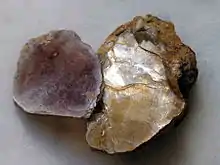muscovite
See also: Muscovite
English

Muscovite
Etymology
In 1850 from Muscovy glass + -ite, from the province Muscovy in Russia. Named by James Dwight Dana.[1]
Noun
muscovite (countable and uncountable, plural muscovites)
- (mineralogy) A pale brown mineral of the mica group, being a basic potassium aluminosilicate with the chemical formula KAl2(Si3Al)O10(OH,F)2; used as an electrical insulator etc.
- 2009, James S. Monroe; Reed Wicander, The Changing Earth: Exploring Geology and Evolution, 5th edition, Belmont, Calif.: Brooks/Cole, →ISBN, page 76:
- Do you enjoy the amber glow seen through the isinglass window of a wood stove? […] Muscovite (colorless, white, or pale red or green) mica is also common […]; it was named for Moskva (Moscow), where much of Europe's mica was mined. Isinglass, mentioned above, consists of thin, transparent sheets of muscovite.
-
Translations
Further reading
- “Muscovite” in David Barthelmy, Webmineral Mineralogy Database, 1997–.
- “muscovite”, in Mindat.org, Hudson Institute of Mineralogy, accessed 29 August 2016.
- Richard V. Gaines, H. Catherine W. Skinner, Eugene E. Foord, Brian Mason, and Abraham Rosenzweig: Dana's new mineralogy, John Wiley & Sons, 1997
French
Italian
This article is issued from Wiktionary. The text is licensed under Creative Commons - Attribution - Sharealike. Additional terms may apply for the media files.